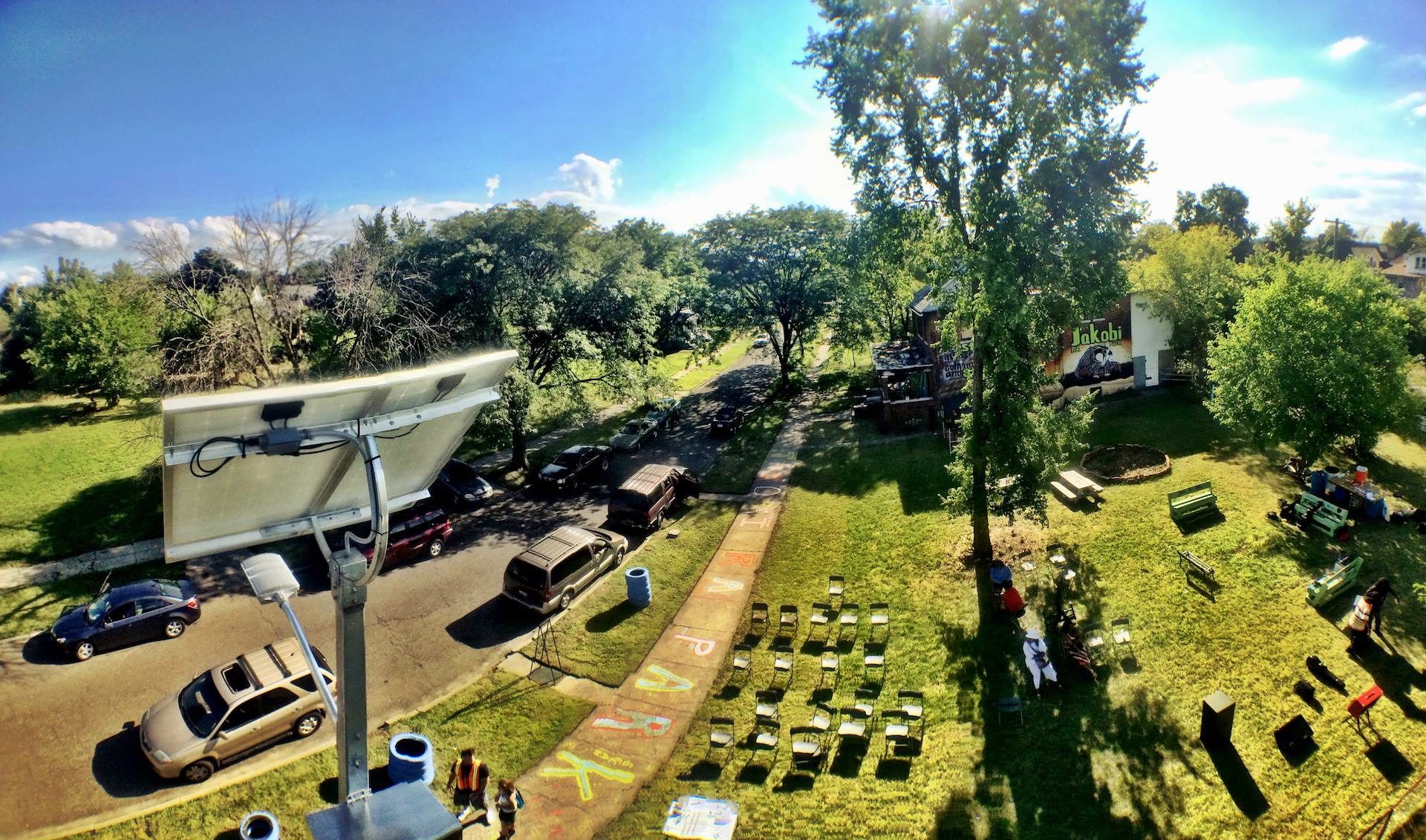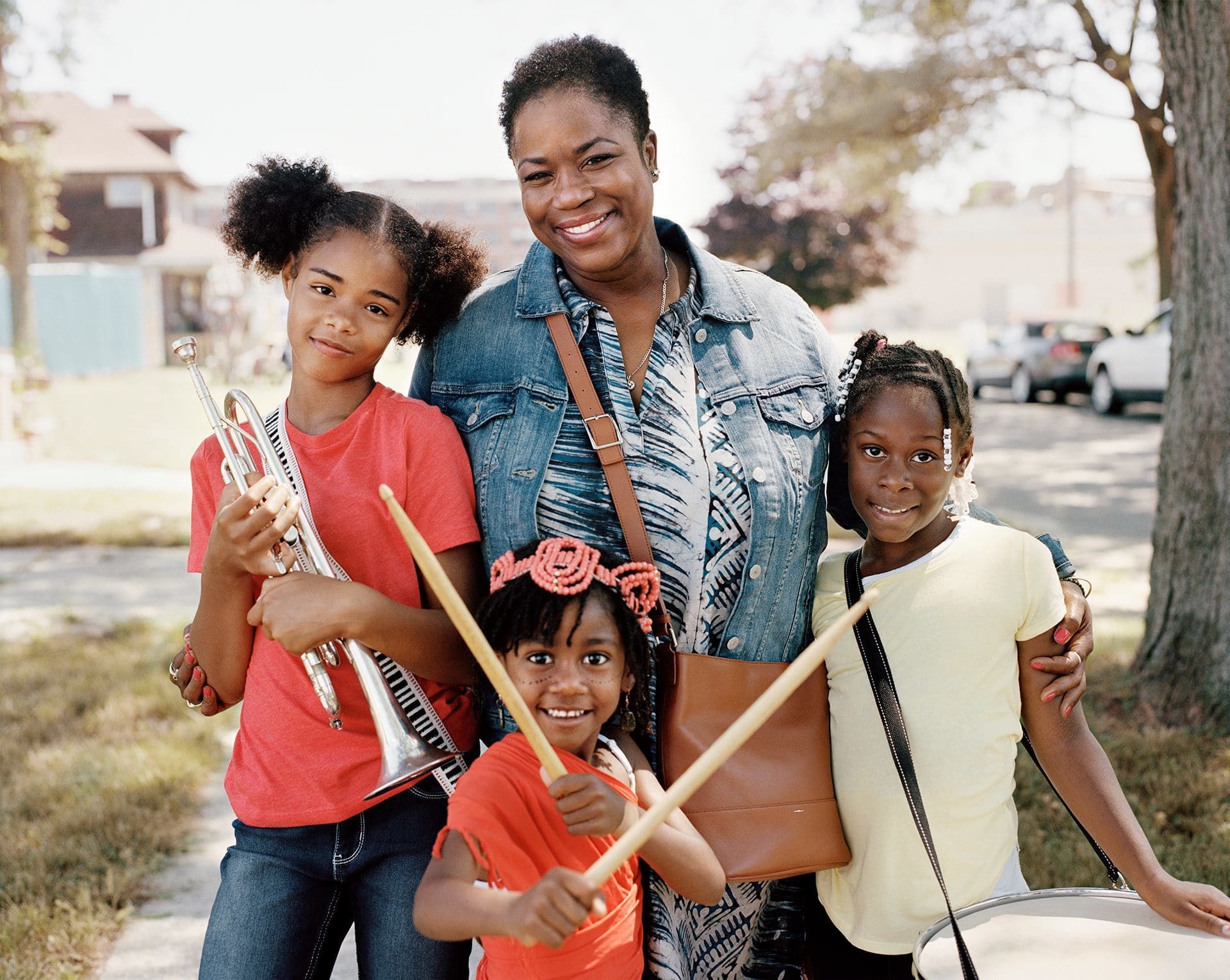United States (Detroit)
One of Detroit’s most blighted inner city blocks is being transformed into an eco-village, led by a powerhouse resident with an inspirational story.
“I’m not an urban planner. I must just have an imagination. Somebody had to do it, so it’s cool I did!” – Shamayim ‘Mama Shu’ Harris
Imagine the place where you live having its streetlights repossessed, with residents and children left to live in the dark for a whole decade. That is exactly what happened in Highland Park, a city inside the city of Detroit that unbelievably lost 1,400 of its streetlights to an unpaid debt in 2011, two years before Detroit itself filed for bankruptcy.
Nearly one hundred years after Henry Ford had begun the mass production of automobiles in 1913 on a moving assembly in Highland Park Plant, Detroit had tumbled into insolvency with almost 20 billion dollars in debt.
However, Highland Park itself refused to see its demise, thanks to being rich in people with big ideas; citizens like Shamayim Harris, who is turning grief into joy to rebuild a more sustainable community house by house. The African American Detroit mother lives in a house on Avalon Street on a Highland Park block that was full of blight, until the activist took to land developing to bring hope to a community. Now people there call her ‘Mama Shu’.

Meet Avalon Village founder ‘Mama Shu’ | Photo: Marcus Lyon
In 2014, Shu brought light – literally – to Highland Park by directing the installation of the area’s first decentralised solar streetlights with the help of community organisation. Two years later she assembled a team of engineers, futurists, artists, urban farmers, volunteers and donors to help build sustainable eco-village, Avalon Village; converting vacant, blighted properties on Avalon Street into an urban oasis.
Just a short distance from the historic Highland Park Ford Plant, some 40 plots of land and houses are being transformed into a series of spaces for children to learn, play and grow in an environmentally sustainable neighbourhood.
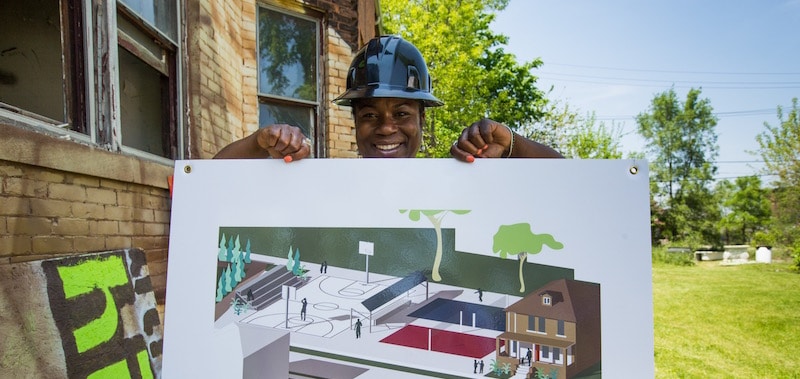
The “mama of the block”, who also serves as the first female chaplain with the Highland Park Police Department, has dedicated her life to serving the people (especially children and elders) in her community, demonstrating that one person truly can make a difference.
Shu told us she has always seen hope amidst despair during hard times and was moved to create Avalon Village because she simply saw a need for it: “I wanted to take a forgotten place and transform it into something beautiful for myself and my neighbours to enjoy. Working with the children and providing resources for our community gives me joy; building something from nothing, transforming blight to beauty and inspiring others to have no fear and to pursue their goals and dreams.”
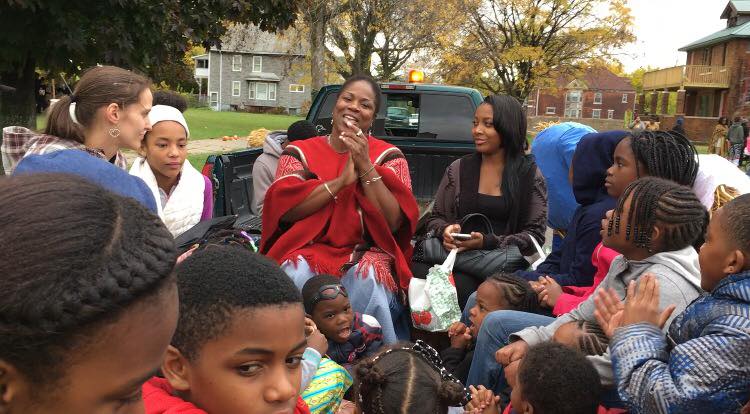
When Shu looks back on her childhood, she thinks about how she loved her neighbourhood, how she thought that it had every single thing that she wanted and needed. “I loved my block so much. The people were beautiful, the elders were open and receptive to me sitting on the porch and asking for advice. I always loved to do the lawn with my grandfather and my grandmother. I feel good about my childhood and I think it’s helped me to be who I am today.”
Sadly, the impetus for creating a safe, welcoming beautiful eco-village that mirrored her childhood was inspired by the tragic loss of Shu’s two year old son, Jakobi RA, who was killed by a hit and run driver in 2007. Six months later, one of the houses on Avalon Street went up for sale for $3,000 and Shu bought it with some small savings, a tax income check and a loan from a friend. “Overcoming the grief of that loss gave me the courage to carry out a vision for my community that I had in my mind for years. Losing a child was my ultimate fear as a mother. That day I became invincible and I wasn’t really afraid after that. I saw the vision of building the village and worked towards it. And it’s been a great healing journey actually.”
Shu honours her son’s memory and embraces his vibrant spirit in everything the transformative project does. She named the first installation after him; Jakobi RA Park is a gathering place for celebrations, community service projects, activities and events – and a lasting tangible memory to her son. “It’s a cool community space. Jakobi gives me courage and he just keeps me going. A lot of things we do are around children and it’s all because of him.”
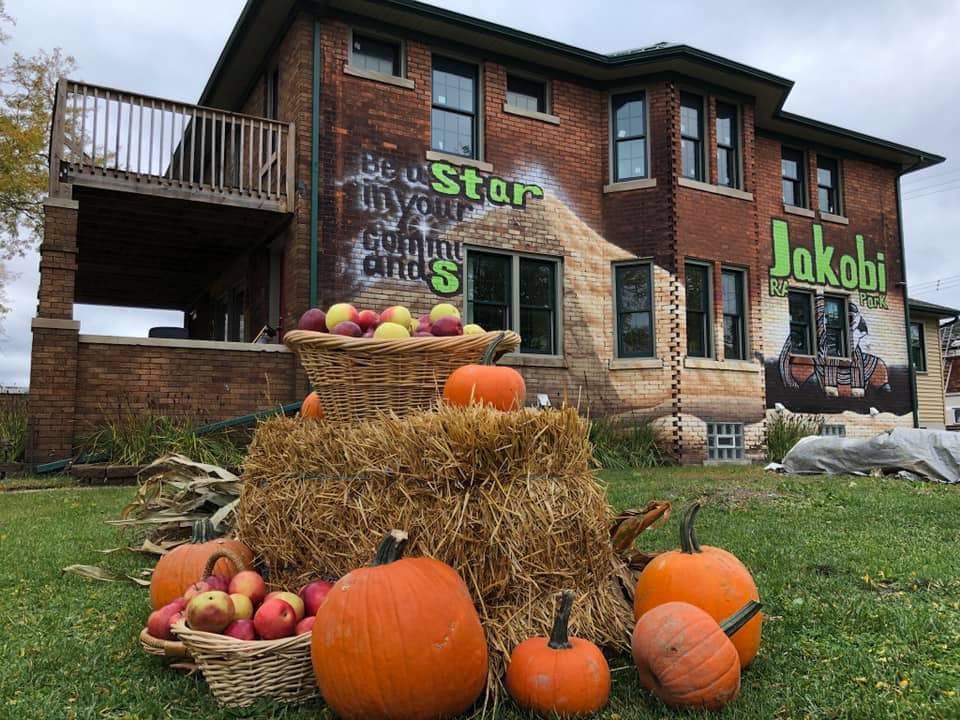
Homework House was the first most important addition to the village. At the big, formerly abandoned brick house, neighbourhood children receive a recreational programme, healthy meals and help with their homework.”The after-school academic space will feature a computer lab and STEM lab, a kitchen, laundry and shower facilities, a recording studio and comfortable places to study and learn. It already has a solar roof and a geothermal heating and cooling system. Outside, there will be basketball and activity courts and a playscape.”
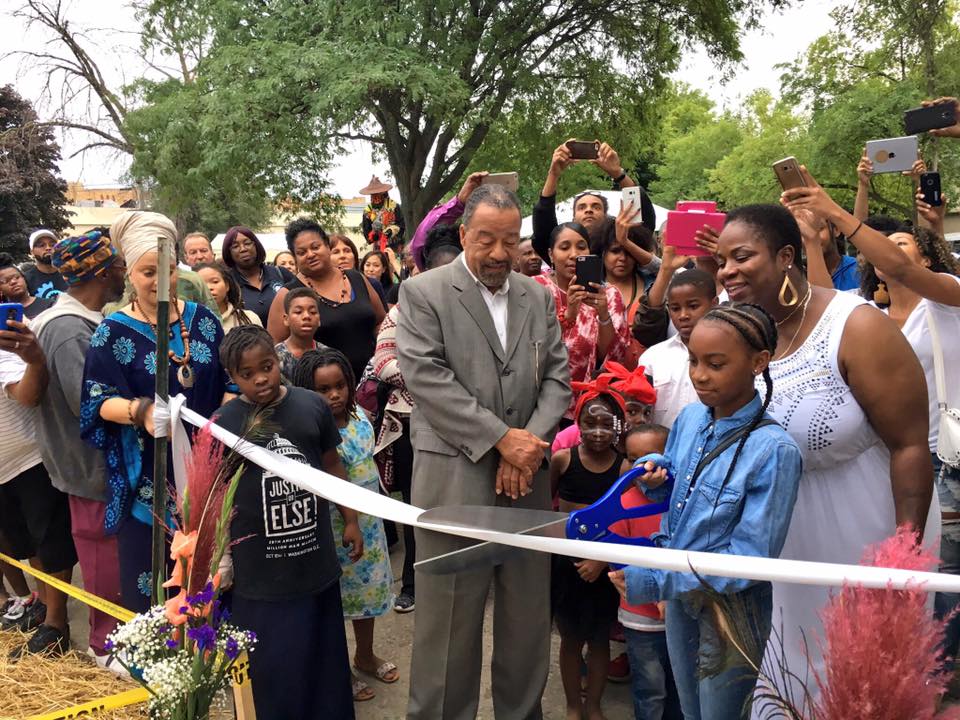
The new spaces will also provide job opportunities to the community. The Blue Moon Café and Greenhouse will provide fresh healthy food in what was an abandoned garage. “The Mississippi Department of Environmental Quality donated the funds and resources to remove underground fuel tanks from the old gas station that was on the corner. The tanks are gone, contaminated land has been cleaned and the lot is just sitting there waiting for the cafe to be built. A nearby greenhouse will help us grow all the vegetables, fruits, herbs and flowers needed.”
Goddess Marketplace is an economic development initiative for women entrepreneurs, Healing House is a centre for holistic healing, plus there will be activity courts, a microlibrary housed inside a shipping container and a mall made of shopping sheds and recycled materials.
“Avalon Village means the best kind of revolution to me – peaceful, empowering, self-less, and sustainable.” Alex Ebert, Lead Artist, Edward Sharpe & the Magnetic Zeroes
Even though the Kickstarter campaign was one of the most-funded and most-backed civic design projects in history, Shu has found that the biggest challenges to building the village have been resources and time. “We are a nonprofit organisation and we started this project from nothing. We have had some wonderful supporters over the years but more help is needed to complete the village. We will continue to build and grow no matter how long it takes.”
The pandemic has increased the need for tutoring and academic support for Avalon students, the kind of support they plan to provide at the Homework House. “It has highlighted the need for internet access and connectivity, and basic needs like food, clothing and shelter. Most of all, the pandemic has highlighted the importance of building community and that is what Avalon Village does best – we help our neighbours. We are optimistic about the future and all that’s to come.”
As a way to utilise the energy and the grief of losing her son, Mama Shu adds that the one block is really not enough. “I will probably need to build a world if I had to gage my grief. So I got a long way to go. Something like that sticks with you. You just live with it. So here I am and I just have the courage to just keep on going. Basically, I’m raising a child in the heavens still.”
AtlasAction: There are many ways to help out: volunteer, connect Avalon with a philanthropic partner, corporation or someone else who can help, donate the items the village needs or make a donation to support the project here.
Read more ► Avalon Village was mapped by artist Marcus Lyon in his Human Atlas: 5 stories from Detroit
Project leader
Shamayim ‘Mama Shu’ Harris,Founder and CEO of Avalon Village
Partners
This project has been selected as part of CultureFutures, a new storytelling project that maps creative and cultural projects with a social mission – and the artists, collectives and entrepreneurs behind them.
Atlas of the Future is excited to join forces with Goldsmiths Institute of Creative and Cultural Entrepreneurship and the British Council Creative Economy.
Support the Atlas
We want the Atlas of the Future media platform and our event to be available to everybody, everywhere for free – always. Fancy helping us spread stories of hope and optimism to create a better tomorrow? For those able, we'd be grateful for any donation.
- Please support the Atlas here
- Thank you!
